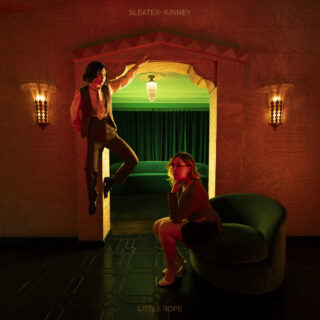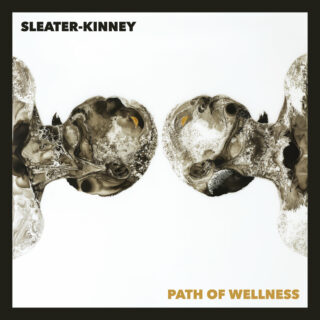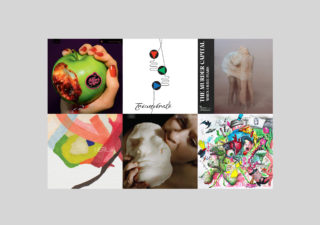The importance of human connections was only reinforced by the devastating circumstances preceding the completion of Little Rope. In autumn 2022, Tucker was contacted by the US embassy in Italy trying to get in touch with her bandmate, having been listed as Brownstein’s emergency contact on an old passport form. Tucker passed on the new number, and the embassy rang Brownstein to break the news that her mother and stepfather had been killed in a car accident in Italy.
In the aftermath of the tragedy, Tucker rallied around her friend, with music functioning as an important tool for healing. “I’d send [Carrie] my ideas and she would text me to say she’d been working on the song for like eight hours straight. It was wild.” Brownstein smiles. “Playing guitar is like a ritual of love,” she says. “There’s something sacred about it; a choreography that reminds you that you’re alive.”
Similarly, Brownstein found herself seeking comfort in Tucker’s singing. “On the last five or six records Corin and I volley the vocal duties back and forth. But I just wasn’t in a place where I could do the kind of sassy vocal that you might hear on the verse of ‘A New Wave’, because that’s simply not where I was at emotionally. My voice was channelled much more through my guitar and so Corin did have to sing more. I needed to hear her voice: that’s part of what got me through.”
Brownstein deals directly with her catastrophic loss on ‘Don’t Feel Right’. Setting out her goals for the future to deceptively buoyant indie-pop, she sings, “I get up, make a list / What I’ll do, once I’m fixed.” By the song’s conclusion she’s succumbed to the sheer incoherency of grief, detailing her new daily routine in the couplet, “Drive around, drown the pain out / Warped from grief, can’t go home.”
And yet, Brownstein is the first to admit that singing honestly about her pain brought a sense of catharsis: “One of the most wondrous things about music is it’s a living thing. A song that was written in sorrow can become celebratory, it can become silly, it can become absurd. Every time you play a song, you experience it for the first time, and that is really the gift of being alive.”
 This determination to seize the moment is stronger than ever in the band. That’s why when Weiss left there was never any question that they might fold completely. “The thing about collaboration is that when you get older, you realise how fragile it is,” says Tucker. “You lose people around you, you’re parenting, you’re taking care of parents that are ageing… Like, there will be things that can and will stop the band. But [Sleater-Kinney] is a really important collaboration, and it’s something that brings me a lot of joy so I want to keep doing it as long as we can.”
This determination to seize the moment is stronger than ever in the band. That’s why when Weiss left there was never any question that they might fold completely. “The thing about collaboration is that when you get older, you realise how fragile it is,” says Tucker. “You lose people around you, you’re parenting, you’re taking care of parents that are ageing… Like, there will be things that can and will stop the band. But [Sleater-Kinney] is a really important collaboration, and it’s something that brings me a lot of joy so I want to keep doing it as long as we can.”
“We really need this band,” Brownstein impresses. “After every record we have to reassess whether the band can speak to the moment and also to the present version of ourselves. And if we can find the authenticity and the honesty within the vessel that is Sleater-Kinney, then there’s always an imperative to return to it, and to continue this ongoing conversation that Corin and I have had with each other for nearly three decades.”
Similarly, their sense of social responsibility remains undimmed, as exemplified by songs like ‘Crusader’. A blast of choppy post-punk, it finds Brownstein taunting, “You’re burning all the books in this town / But you can’t destroy the words in our mouths.”
Outlining the context, she explains, “[The song] acknowledges that things have grown dire. As a queer person, it’s hard to believe that we’re in a place again where our very existence is a threat to someone, particularly in the broader LGBTQ+ community where trans lives are being threatened and legislated against. And the trespasses on bodily autonomy across the board are absolutely exhausting. But ‘Crusader’ imagines that instead of shrinking, you grow and resist smallness and self-effacement.”











